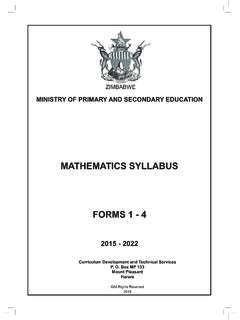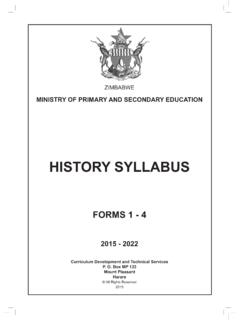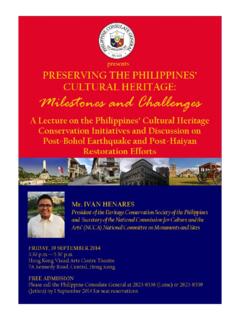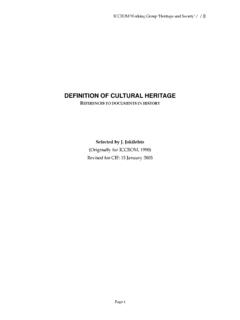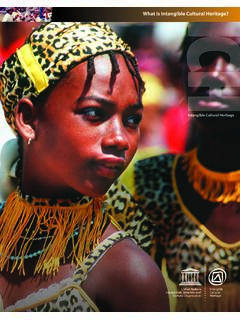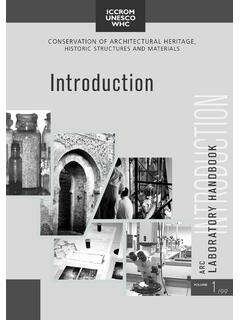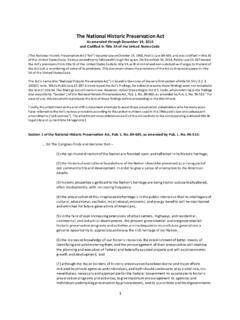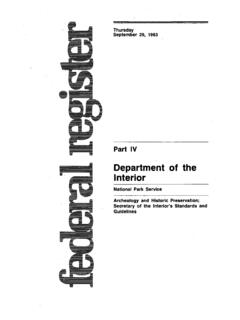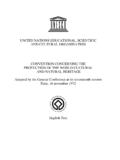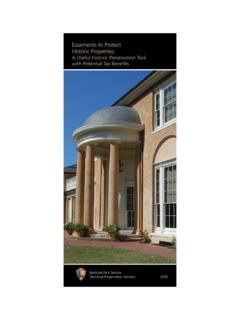Transcription of HERITAGE - SOCIAL STUDIES
1 MInISTRY Of PRIMARY AnD SECOnDARY EDUCATIOnHERITAGE - SOCIAL STUDIESjUnIOR (GRADE 3-7) SYLLABUS(2015 - 2022)Curriculum Development and Technical Services, Box MP 133, Mount Pleasant, HarareAll Rights ReservedRevised 2015 ZIMBABWEH eritage and SOCIAL Junior 1 13/10/2016 1:00 PM Page 1iHeritage SOCIAL STUDIES Junior (Grade 3 - 7) SyllabusACKNOWLEDGEMENTSThe Ministry of Primary and Secondary Education wishes to acknowledge the followingfor their valued contribution in the production of this syllabus:lThe National Primary HERITAGE - SOCIAL STUDIES Syllabus Panel for their professionaland technical inputlRepresentatives from universities, technical colleges, teachers colleges, church or-ganisations, book publishers and former educationistslThe Zimbabwe Schools Examinations Council for their contribution on assessmentlUNICEFlUNESCOH eritage and SOCIAL Junior 1 13/10/2016 1:00 PM Page iiiHeritage SOCIAL STUDIES Junior (Grade 3 - 7) SyllabusTABLE OF Summary of Cross-Cutting PRESENTATION OF THE SYLLABUS METHODOLOGY AND TIME and Time SCOPE AND AND and SOCIAL Junior 1 13/10/2016 1:00 PM Page ii1 HERITAGE SOCIAL STUDIES Junior (Grade 3 - 7) IntroductionThe HERITAGE - SOCIAL STUDIES syllabus covers Infantand Junior school cycles in primary education.
2 Thesyllabus covers the SOCIAL history of the people ofZimbabwe, cultural interdependence, local cultures, HERITAGE values and religious focus of the syllabus is on facilitating thelearner to become a responsible member of his /her family and of Zimbabwe. It has a thrust onZimbabwean identity, norms and values through theinclusion of aspects of HERITAGE STUDIES , thusupholding the spirit of Unhu/Ubuntu/Vumunhu(societal norms and values). It is envisaged that thesyllabus will produce learners who are patriotic,diligent and prepared for diverse vocation andcreative STUDIES embraces the Zimbabweanconstitution, patriotism, national identity, nationalsymbols and factors of production such as land,capital, labour and enterprise. It also encompassesthe history, traditions and SOCIAL qualities which areconsidered an important part of Zimbabwe s STUDIES is the study of people and theirrelationship with the environment. HERITAGE -SocialStudies moulds the human character and is thefoundation of Unhu/Ubuntu/Vumunhu.
3 It developsa spirit of national consciousness and patriotismthrough interest and involvement in national affairs,conservation and ownership of natural HERITAGE . Itdevelops in the learner, skills of critical thinking,problem solving, leadership and self-esteem,Information and Communication Technology (ICT)and resources management leading to SOCIAL andeconomic Summary of ContentThe HERITAGE - SOCIAL STUDIES syllabus main thrustis upholding and sustaining: lUnhu/Ubuntu/Vumunhu (societal norms andvalues)lFamily, relationships and preservation of ournational heritagelCollaboration with others to improve thelearners societylPatriotism It instils problem solving, critical thinking skills,leadership, communication, enterprise andtechnological is assumed that the learners;lbelong to a SOCIAL familylinteract with their peerslknow some national symbols and heritagesiteslunderstand and accept their cultural diversitylcan communicate and think logically lappreciate the relevance of their learninglengage in project work, co-operative work andself-assessment Cross-Cutting Themes The following cross cutting or emerging issues helpthe learner to acquire competencies for equity lFamily unitylChild Protection from abuse and diseasessuch as AIDSlHeritage StudieslEnvironmental IssueslFinancial literacy lDisaster Risk ManagementlChildren s Rights and PRESENTATION OF THESYLLABUSThe HERITAGE - SOCIAL STUDIES Syllabus is presentedin two documents as follows: HERITAGE and SOCIAL Junior 1 13/10/2016 1.
4 00 PM Page 12 HERITAGE SOCIAL STUDIES Junior (Grade 3 - 7) SyllabuslInfant (ECD - Grade 2) lJunior (Grade 3 7) The two documents carry the same informationfrom the preamble up to the Scope and SequenceChartAll grades have the same topics that aredevelopmental in nature. AIMSThe aims of the syllabus are to enable the child to:lappreciate and love Zimbabwe and itsChimurenga/Umvukela Liberation war heroesand heroinesldevelop an appreciation of national HERITAGE ,sovereignty, governance, national symbols andevents lunderstand and appreciate Zimbabwe s pre-colonial, colonial and post-colonial history ldevelop an understanding of Zimbabweancultural institutions and practices such asmarriages, inheritance systems, spiritual values and usage of artefacts ldevelop a spirit of national consciousness,identity and patriotism through involvement innational functionslappreciate and sustain Unhu/Ubuntu/Vumunhuthrough interaction with family, community andsociety at largelappreciate the value and dignity of work.
5 Recreation and the need for participation innational developmentlappreciate the need for equal opportunities forall and sensitivity to the needs of thedisadvantaged and vulnerable SYLLABUS OBJECTIVESBy the end of the HERITAGE - SOCIAL STUDIES PrimarySchool Syllabus, learners should be able to:lidentify with national symbols such as theNational Flag, National School Pledge,Anthem, Monuments and HERITAGE siteslexplain the significance of public holidays andother national eventsldemonstrate ways of showing respect for selfand otherslexhibit norms, values and appropriateresponsible behaviourldifferentiate between new and old means oftransport, Information and CommunicationTechnology (ICT)lexplain how modes of transport and ICTfacilitate communication among people andcountriesljustify the importance of work and leisurelexplain key events and importance of the Firstand Second Chimurenga/Umvukela liberationstrugglelcompare the practices of their own communityculture and that of others lidentify appropriate shelter for humans andanimalslexplain the need of equal opportunities for allcitizens of Zimbabwelidentify the global environmental issues thataffect livelihoodsldescribe the production and marketing ofgoods and METHODOLOGY AND TIME Methodology A spiral approach should be adopted,beginning with the learner s immediateenvironment, broadening to an exploration ofhis/her wider community and finally extendingto the wider world.
6 Learners need to developHeritage and SOCIAL Junior 1 13/10/2016 1:00 PM Page 23 HERITAGE SOCIAL STUDIES Junior (Grade 3 - 7) Syllabusappropriatevalue systems through participating in plannedactivities. Effective teaching and learning inHeritage- SOCIAL STUDIES depends upon the useof participatory methods. These include thefollowing:(a) discussion(b) drama, role-play and simulation(c) song and dance(d) case STUDIES (e) puppetry(f) gallery walk(g) research(h) futures wheel(i) miming(j) e-learning (k) group work(l) question and answer(m) Individual Early Learning Programme (IELP)(n) games For adequate coverage of the syllabus, the followingallocation is : 2 periods of 20 minutes per weekGrade 1 and 2 : 3 periods of 30 minutes per weekGrade 3 to 7 : 4 periods of 30 minutes per weekFor the successful implementation of the HERITAGE - SOCIAL STUDIES Syllabus the following activities arerecommended:lEducational tours at least once per yearlSchool festivals Day once a yearlHeritage Culture Day once a yearNOTE: These events can be organised at school, district,provincial and national TOPICSlIdentity.
7 Family History and Local HeritagelCultural HERITAGE lNational History, Sovereignty and Governance lEntitlements/Rights and ResponsibilitieslShelterlSocial Services and Volunteerism lNatural HERITAGE : Production, Distribution andConsumption of Goods and ServiceslTransport and CommunicationlWork and LeisurelGlobal Issues HERITAGE and SOCIAL Junior 1 13/10/2016 1:00 PM Page 34 HERITAGE SOCIAL STUDIES Junior (Grade 3 - 7) Syllabus $ $ $ $$$$$ $$ $ $ $ $ $$GRADE 3 GRADE 4 GRADE 5 GRADE6 GRADE 7 Family genealogies Family names and totems Purpose of the totem system Local heroes and heroines Indigenous hunting tools Indigenous religious practices Roles and status of family members Family aspirations Family gatherings Indigenous processing tools such as duri/umgigo, guyo/imbokodo Local shrines and monuments Types of family: - nuclear - monogamous - polygamous - child headed - one parent Family and surrounding community Indigenous community gatherings and events Human migration Conflict management at family , school and community levels Languages and cultures in Zimbabwe National monuments Clans of Zimbabwe Cultural values of motherhood in the pre-colonial era Cultural values of fatherhood in the pre-colonial era Significance of customs, beliefs, folklore, games, songs and dances Indigenous languages and cultures in Zimbabwe Indigenous governance Indigenous HERITAGE resources Marital relationships Conflict management Different languages and cultures of Zimbabwe Custodians of culture preservation of HERITAGE sites TOPIC 2: CULTURAL HERITAGE Friendship Relationships Family ceremonies and rituals Children s games Family ceremonies and rituals.
8 -birth -adolescence -marriage -death - after burial Customs of different cultural groups Indigenous medicines and related cultural practices Children s games Rites of passage for boys and girls Courtship Indigenous ways of getting married and ceremonies Marriage: civil and customary Children s games Courtship practices of different cultural groups Heirship within the family Age of consent to sex and marriage Healthy boy-girl relationships Effects of age on marriage and population growth Child bearing SCOPE AND SEQUENCE TOPIC 1: IDENTITY: FAMILY HISTORY AND LOCAL HERITAGETOPIC 2: CULTURAL HERITAGEH eritage and SOCIAL Junior 1 13/10/2016 1:00 PM Page 45 HERITAGE SOCIAL STUDIES Junior (Grade 3 - 7) Syllabus GRADE 3 GRADE 4 GRADE 5 GRADE6 GRADE 7 National events/ celebrations Symbols of unity The early people of Zimbabwe: The Khoisan and Bantu Contribution of the early people to the Zimbabwean HERITAGE The need for rules and laws Observing the laws: the role of individuals, community, police and the courts Development of indigenous laws: - village court - headman s court - chief s court National School pledge The pre-colonial kingdoms: Rozvi, Mutapa and Ndebele Effects of first contact with Europeans: -missionaries -hunters and mineral prospectors Local Government: - rural - urban -metropolitan provinces Roles of village head, headman, chief and councillor Systems of Governance.
9 -egalitarian -autocracy -democracy Structures and functions of Central Government Colonisation of Zimbabwe First Chimurenga/ Umvukela Second Chimurenga/ Umvukela and sovereignty National symbols and celebrations National School pledge Independence and self-governance The Land Reform Programme National School pledge Zimbabwe as a member of other regional and international organisations TOPIC 3: NATIONAL HISTORY, SOVEREIGNTY AND GOVERNANCEH eritage and SOCIAL Junior 1 13/10/2016 1:00 PM Page 56 HERITAGE SOCIAL STUDIES Junior (Grade 3 - 7) Syllabus GRADE 3 GRADE 4 GRADE 5 GRADE6 GRADE 7 Entitlements/ Rights and responsibilities of children Gender equity in the community Division of labour at home and school Indigenous cultural beliefs and taboos Reporting abuse Children s entitlements/ rights and responsibilities Child protection Substance abuse Rules and laws that protect children from abuse The Rights of the child Citizenship Rights and responsibilities of a citizen Abuse of children, women, men and the disadvantaged Gender based protection The role of the police and judiciary Law making process in Zimbabwe Gender stereotypes Gender equity in the work place Elections Ownership of property Inheritance Indigenous institutions and domestic legislation on gender equity Consumer rights TOPIC 5.
10 SHELTER GRADE 3 GRADE 4 GRADE 5 GRADE 6 GRADE 7 Functions of buildings and other types of shelter Shelter and HERITAGE sites Indigenous forms of shelter Shelter in other countries Materials used to make shelter Types of shelter according to geographical areas Shelter and HERITAGE sites Health and safety in shelter designs Special buildings and designs for disaster prone areas Development of settlements in Zimbabwe Siting of shelter in urban and rural areas Disaster and risk management Problems and solutions to shortages of shelter Factors that influence shelter siting and design Ways of acquiring accommodation TOPIC 4: ENTITLEMENTS/RIGHTS AND RESPONSIBILITIES TOPIC 5: SHELTERH eritage and SOCIAL Junior 1 13/10/2016 1:00 PM Page 67 HERITAGE SOCIAL STUDIES Junior (Grade 3 - 7) Syllabus GRADE 3 GRADE 4 GRADE 5 GRADE6 GRADE 7 Government as a SOCIAL service provider The needy in the society and access to information Local SOCIAL service providers Functions of local SOCIAL service providers Prominent people and organisations involved in voluntary work, in the past and present at local and national level Local voluntary organisations that empower the vulnerable and disadvantaged Provision of SOCIAL services in Zimbabwe Government departments and institutions Participation in voluntary work Prominent people involved in voluntary work in the past and present Participation in voluntary work Voluntary and humanitarian organisations in the country TOPIC 7: NATURAL HERITAGE .




